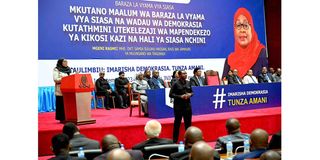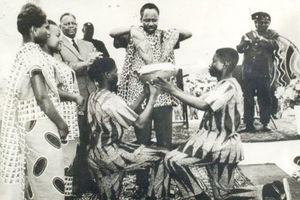Prime
Chadema defends position on boycotting parties talks

President Samia Suluhu Hassan addresses the political parties council on Monday in Dar es Salaam.
Dar es Salaam. The three-day meeting of the political parties’ council concluded in the city yesterday, leaving politicians and political analysts split over Chadema’s decision to continue skipping similar conferences.
However, the party defended its position through its Secretary General, Mr John Mnyika, claiming it has done a lot to promote the national reconciliation agenda.
The political parties’ council was inaugurated on Monday by President Samia Suluhu Hassan as part of her 4Rs [Reconciliation, Resilience, Reform, and Rebuild] agenda. It is the brainchild of the Office of the Registrar of Political Parties.
The sessions aimed to bring together various political players so that they could discuss issues that affected them and propose methods to improve the playing field.
While almost all other political parties as well as some religious leaders and diplomats were in attendance, Chadema once again chose to play the ball close to their chest.
The Chadema vice chairman (Zanzibar) was present, but it could not be immediately established whether he attended as just a stakeholder in the political arena or as a representative of the opposition party.
This is one of several meetings called to chat out Tanzania’s democratic path in line with President Hassan’s 4R’s, which Chadema boycotted.
Similarly, the party did not take part in what came to be known as the Dodoma Conference on the State of Multiparty Democracy in Tanzania, which took place in the capital city from December 15 to December 17, 2021, and in which the Registrar of Political Parties widened the participation to include civil society organisations, religious institutions, and prominent and influential individuals in the field.
Pundits are divided on the boycotting approach and whether or not it is helping the nation’s democracy flourish. While some believe Chadema, which commands a sizable number of followers mainly on Tanzania’s mainland, may have decided to remain out of the meetings for valid reasons, some believe that their voice was badly needed in such meetings.
“We saw their Vice Chairman (Zanzibar), but I am not sure if he attended in his capacity as a political stakeholder or as a representative of the opposition party... Otherwise, I believe that they should have brought their ideas here because, by boycotting, they are not only denying themselves the opportunity to air out their party views but also denying Tanzanians who are eager to know where their party stands on issues being discussed,” said the Secretary General of the Democratic Party (DP), Mr Abdul Mluya.
A member of the ACT-Wazalendo Central Committee, Mr Ismail Jussa, shared similar sentiments, saying boycotting such dialogues reduces alternative voices.
“Boycotting is one of the political tools, but you need to assess the issue being boycotted for... Even we in our party once held such sentiments, but now we have decided to address them on this platform. Coming here doesn’t mean you approve of everything,” he said.
According to the ACT-Wazalendo Party leader, Mr Zitto Kabwe, much as he believes the boycotting parties have their reasons, he is a believer in the fact that dialogue remains the right path to the admired reforms.
“I believe in political engagements. I can understand other parties’ continued boycotting as they know their reasons better. However, for a country like ours, dialogue is the bridge to reforms, and our party will pursue that route,” he said. However, according to Mr Mnyika, Chadema has done a lot about advancing the national reconciliation agenda, adding that it will have to put everything open at the opportune time.
“It is the government that is actually against the reform agenda. It doesn’t want to cooperate on reforming several national issues. One day, we will have to openly say the issues on which we agreed with the government during the past year and I hope you [the people] will understand us,” said Mr Mnyika.
He said what the government was doing was manipulating people’s thinking by trying to portray the message that it was Chadema that was not willing to buy into the ongoing reform agenda.
The coordinator for the Tanzania Human Rights Defenders Coalition (THRDC), Mr Onesmo Orengurumwa, said Chadema may have maintained its boycotting stance due to its belief that that could be the only way to let the government realise the need for a new constitution.
“The party believes that a new constitution will solve several challenges facing the nation.
A political analyst, Dr Onesmo Kyauke, said Chadema could have been boycotting such meetings because political parties in Tanzania do not trust each other.
“Given this, the party believes that these meetings are merely meant to rubber-stamp the government’s agenda. It could be boycotting to avoid their party being involved in supporting the government’s decisions on different national matters,” he said.
Dr Richard Mbunda, a political analyst, said Chadema stays out of these meetings because their interests are not given priority. “The party’s number one interest for now is the new constitution, which doesn’t seem to be on the government’s priority agenda,” he said.
Meanwhile, winding up the meeting yesterday, the Second Vice President of Zanzibar, Mr Hemed Suleiman Abdulla, said the government has received the recommendations and proposals as discussed and that they will be worked on for the broader interests of the nation and to improve the state of politics and democracy in the country.
The minister of State, Prime Minister’s Office (Policy, Parliament, and Coordination), Ms Jenista Mhagama, said the government values the contributions of stakeholders and will ensure that it implements the proposed resolutions from the three-day meeting.
Resolutions
Chairing a dialogue session involving political parties, Prof Bernadeta Killian stated that the resolutions of the meeting include commending President Samia Suluhu Hassan for improving the political environment but also the suggestions that new election legislation and amendments to political party laws, as well as election cost laws, be presented in the upcoming parliamentary session to broaden participation.
“Stakeholders have also requested that the constitutional review process begin and a special committee be formed by the government to engage stakeholders and ensure more input is included,” Prof Killian added.
She also mentioned that stakeholders have suggested researching to address the low voter turnout during the previous elections and how that can be avoided in the coming 2024 and 2025 elections.





